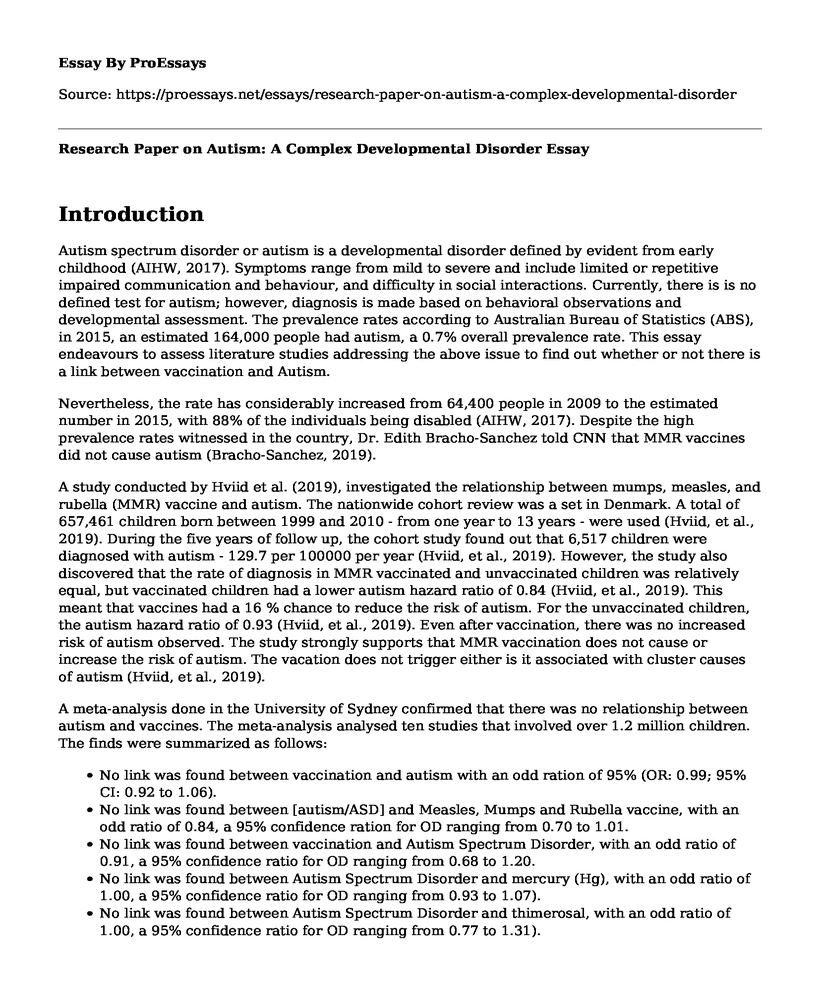Introduction
Autism spectrum disorder or autism is a developmental disorder defined by evident from early childhood (AIHW, 2017). Symptoms range from mild to severe and include limited or repetitive impaired communication and behaviour, and difficulty in social interactions. Currently, there is is no defined test for autism; however, diagnosis is made based on behavioral observations and developmental assessment. The prevalence rates according to Australian Bureau of Statistics (ABS), in 2015, an estimated 164,000 people had autism, a 0.7% overall prevalence rate. This essay endeavours to assess literature studies addressing the above issue to find out whether or not there is a link between vaccination and Autism.
Nevertheless, the rate has considerably increased from 64,400 people in 2009 to the estimated number in 2015, with 88% of the individuals being disabled (AIHW, 2017). Despite the high prevalence rates witnessed in the country, Dr. Edith Bracho-Sanchez told CNN that MMR vaccines did not cause autism (Bracho-Sanchez, 2019).
A study conducted by Hviid et al. (2019), investigated the relationship between mumps, measles, and rubella (MMR) vaccine and autism. The nationwide cohort review was a set in Denmark. A total of 657,461 children born between 1999 and 2010 - from one year to 13 years - were used (Hviid, et al., 2019). During the five years of follow up, the cohort study found out that 6,517 children were diagnosed with autism - 129.7 per 100000 per year (Hviid, et al., 2019). However, the study also discovered that the rate of diagnosis in MMR vaccinated and unvaccinated children was relatively equal, but vaccinated children had a lower autism hazard ratio of 0.84 (Hviid, et al., 2019). This meant that vaccines had a 16 % chance to reduce the risk of autism. For the unvaccinated children, the autism hazard ratio of 0.93 (Hviid, et al., 2019). Even after vaccination, there was no increased risk of autism observed. The study strongly supports that MMR vaccination does not cause or increase the risk of autism. The vacation does not trigger either is it associated with cluster causes of autism (Hviid, et al., 2019).
A meta-analysis done in the University of Sydney confirmed that there was no relationship between autism and vaccines. The meta-analysis analysed ten studies that involved over 1.2 million children. The finds were summarized as follows:
- No link was found between vaccination and autism with an odd ration of 95% (OR: 0.99; 95% CI: 0.92 to 1.06).
- No link was found between [autism/ASD] and Measles, Mumps and Rubella vaccine, with an odd ratio of 0.84, a 95% confidence ration for OD ranging from 0.70 to 1.01.
- No link was found between vaccination and Autism Spectrum Disorder, with an odd ratio of 0.91, a 95% confidence ratio for OD ranging from 0.68 to 1.20.
- No link was found between Autism Spectrum Disorder and mercury (Hg), with an odd ratio of 1.00, a 95% confidence ratio for OD ranging from 0.93 to 1.07).
- No link was found between Autism Spectrum Disorder and thimerosal, with an odd ratio of 1.00, a 95% confidence ratio for OD ranging from 0.77 to 1.31).
According to the above finds, MMR vaccines had a probability of reduced autism risk with an OD of 0.84 (16% risk decline). All studies registered a 95% confident ratio (CL) Tay14 (Autism Speaks, 2019; Taylor, et al., 2014).
Conclusion
It evident from the above studies and publications that there is no relationship between vaccinations and autism. In fact, like Taylor et al. (2014) analysis suggests, vaccinations had a 16% ability to reduce the risk of autism. The studies also found that there was no prevalence difference between children who were vaccinated and those that were not. Besides, according the Austrian health department, all vaccines used in the country have to be thoroughly tested before they are approved.
References
AIHW, 2017. Autism in Australia, Melbourne: Australian Institute of Health and Welfare.
Autism Speaks, 2019. New Meta-analysis Confirms: No Association Between Autism and Vaccines, Sydney: Autism Speak.
Bracho-Sanchez, D. E., 2019. MMR vaccine does not cause autism; another study confirms. [Online] Available at: https://edition.cnn.com/2019/03/04/health/mmr-vaccine-autism-study/index.html[Accessed 07 October 2019].
Hviid, A., Hansen, J. V., Morten Frisch & Melbye, M., 2019. Measles, Mumps, Rubella Vaccination, and Autism: A Nationwide Cohort Study. Annals of Internal Medicine, 70(8), pp. 513-520.
Taylor, L., Swerdfeger, A. & GD, E., 2014. Vaccines are not associated with autism: an evidence-based meta-analysis of case-control and cohort studies. Journal of Vaccine, 32(29), pp. 623-629.
Cite this page
Research Paper on Autism: A Complex Developmental Disorder. (2023, Feb 23). Retrieved from https://proessays.net/essays/research-paper-on-autism-a-complex-developmental-disorder
If you are the original author of this essay and no longer wish to have it published on the ProEssays website, please click below to request its removal:
- Summary of the Article: Impact of Gratitude of Resource Development and Emotional Well-being
- Essay on Relationship between Society and an Individual's Self Understanding
- Post-Traumatic Stress Disorder Research Paper
- Essay Sample on Knowledge Competencies as the Emphasis on Organizational Growth and Approach
- Essay Sample on Parents of Autistic Children: Perceptions and Use of Supplemental Treatments
- Paper Example on Grieving Parents: A Tragic Loss of a Child With Chronic Illness
- PTSD: Mental Disorder Following Stressful Events - Essay Sample







